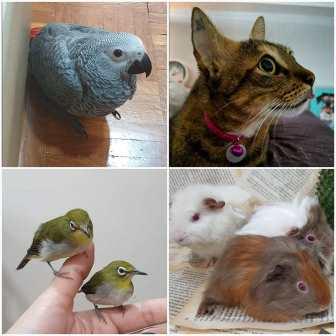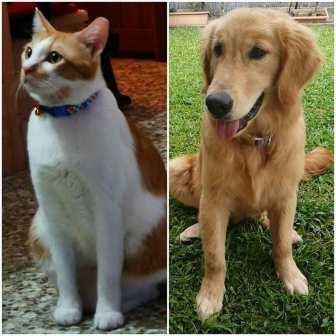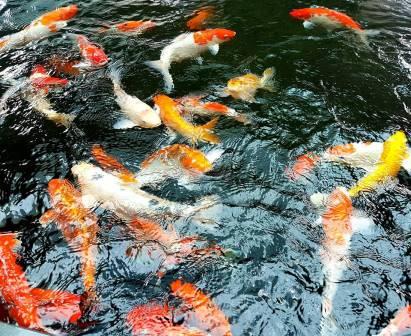Article by Singapore Feng Shui Master Edwaard Liu
Do you know your pets do affect the Feng Shui of your home? Find out what are the impact they have on your life, not just emotionally but also how their energies interact with the energies of your premise.
In ancient Feng Shui text there are emphasis on where one should place the corrals(enclosure of livestocks ). It is classified under the “External six Matters” (外六事) of Feng Shui, which includes,roads, water wells, toilets, corrals, temples and bridges. It defines how external structures that will affect the Feng Shui of traditional Chinese houses with courtyards. The six livestock/animals in the olden days include horses, cows, goats, chickens, dogs, pigs. These are animals that are kept outside the house, because they are considered unclean for the living space for humans.

For modern homes, we no longer have water wells or toilets outside the house. Most people do not keep livestock in their premises, especially when there are strict rules if you live in a Singapore HDB Flat or Condominium. Instead people welcome pets to stay with them in the house. Dogs are kept in the house, together with more popular pets like, cats, hamsters, tortoises, rabbits, fishes and birds.
In Feng Shui, we study the elements that reside in the various sectors of the premise and identify their effect on the occupants; we also identify the elements that help in enhancing the good energies and harmonising the negative energies. For example if a particular sector has good earth element, we enhance it with more earth or fire elements(fire produce earth).
If the pets can be classified into the 5 elements, Dogs are earth element, cats are wood elements, tortoises are fire element, rabbits are wood element, fishes and rats are water element, and birds are fire elements.

However I do not recommend buying pets as remedy or enhancement to your premise’s Feng Shui, because there are other easier ways of doing it. I also do not encourage buying pets on impulse, some people believe that when it is the year of the animal zodiac, they buy that particular animal for good luck (e.g. buying dog for dog year). It doesn’t hold any true to it.
A pet’s welfare depends on its owner; it does not have any choice. Animals have feelings and emotions too, if a pet is mistreated, and it is upset, its emotion will also affect the environment. That is one reason why we cannot stay near abattoir or animal slaughter house. Sometimes we can hear sad neglected pets crying, whimpering or howling for attention, sad emotions results in negative energies.
Other times we see aggressive or untrained dogs barking at everyone that passes by their unit. Emotions carry energies, the aggressive barking has energies, and it evokes anger or fear from the passer-by who also leaves behind negative energies outside your premise, which is not good for the occupants too.
In a premise there are good and bad sectors, if pets are kept and confined in sectors that has illness energies, the pets will be affected by the negative energy and get sick easily. Pets do activates the energies of a particular sector too, if there are lots of activity or movement at illness sector, it will also activate the energies located there and influence health of occupants in the premise. On the other hand if there are movement at the wealth sector, the wealth energies will be activated. But please don’t expose your pets to the sun, rain or wind just to activate your good sectors, because it will bring bad karma to you if you cause them to suffer.
If a premise is small and has lots of humans and animals sharing the same space, it is not good for Feng Shui; too much “Yang” energies results in dispute and disharmony. Pets should have enough space to roam around, if pets are always keep in small confined space; it is not good for them. If they are free to walk around the house, they help to circulate energy within the premise; it is especially good for big houses with few occupants that are usually “yin” with stagnant energies. If you do not have intention to keep pets; plants may be a better option for enhancing the energies of your premise.
Hygiene is an important issue in Feng Shui, in olden days, toilets and livestock are kept outdoors, as seen in the “External six Matters” in Feng Shui. In those times, they do not have the modern flushing system, their toilet consist of a hut with a cesspool which are kept a distance from the living space. Animals do not use the toilet and are therefore kept outside the house too.
Some pets are “toilet trained”, they will do their “businesses” in designated places, and other pets that cannot be toilet trained do their “businesses” where they are kept. If a premise is dirty and smelly it will affect the Feng Shui energies in the premise. If a particular sector in a premise already has negative energies (illness, disharmony) it will be aggravated by the bad smell or filth. However, if particular sector in a premise has good energy (wealth, health, harmony) but it is dirty or smelly, it will negate the effect of the good energies there; resulting in illness, disharmony, and scandal or loss of wealth. Even though some pets are trained to do their business in the toilet, for modern apartment or flat the space are small, so smells are not confined to the particular sector only it may spread to the whole house. Cleanliness is very important when it comes to Feng Shui. Please be a considerate pet owner if they poop in a public place, it will affect the Feng Shui of the environment.
Some people keep fishes as Feng Shui remedies for their premise. It is not the fishes that affect the Feng Shui, it is the water that will affect the Feng Shui. In Feng Shui theory, energies gather wherever there are water. The location of your aquarium or pond has an influence on the Feng Shui of your premise. If the aquarium has moving water that is caused by a pump, it is considered “moving water” or “Yang” water, moving water activates the energies at the sector it is being placed. Therefore knowing where are the good sectors and what energies you are going to activate are important before you buy your aquarium; because moving water activates bad energies if placed at the wrong sector.

“Non-moving” or “Yin” water, are used to harmonise some negative energies if you know how to do it properly. A large tank with a few guppies are considered “non-moving” water. Before you decide to put large volume of water inside or outside your premise, you need to know if water element is favourable for your premise and whether it should be moving or non-moving. If the water is dirty and smelly, will just be bad energies and bad Feng Shui regardless of where you place the tank; so clean your fish tank often.
Humans generally have longer life span than their pets, grieving for deceased pet is part of the process of owning a pet. The feeling of sadness and loss for our beloved pets are understandable, remember the good memories, we must tell our self we didn’t keep pets to be sad. Sometimes, pet owners will store their pet’s ash in an urn and place it at home. From Feng Shui perspective, it is not suitable because dead animals are “Yin” energies and should not be in the same space as living human that are “Yang” energies. From a spiritual perspective, dead humans or animals must be buried in the ground to have peace. 入土为安. Earlier I wrote an article on what not to do to the human remains, which applies to remains of pets too.
In summary, keep your pets happy and healthy; keep the space you share with them clean. Be a responsible pet owner and it is not advisable to use them as Feng Shui enhancements or cure.
Find out more about what we can do for your premise’s Feng Shui.
CONTACT US NOW!
Whatsapp us at 65-9320 4100 to make an appointment with Master Edwaard Liu today! Best Feng Shui solutions to improve your wealth, health, harmony and relationships.

